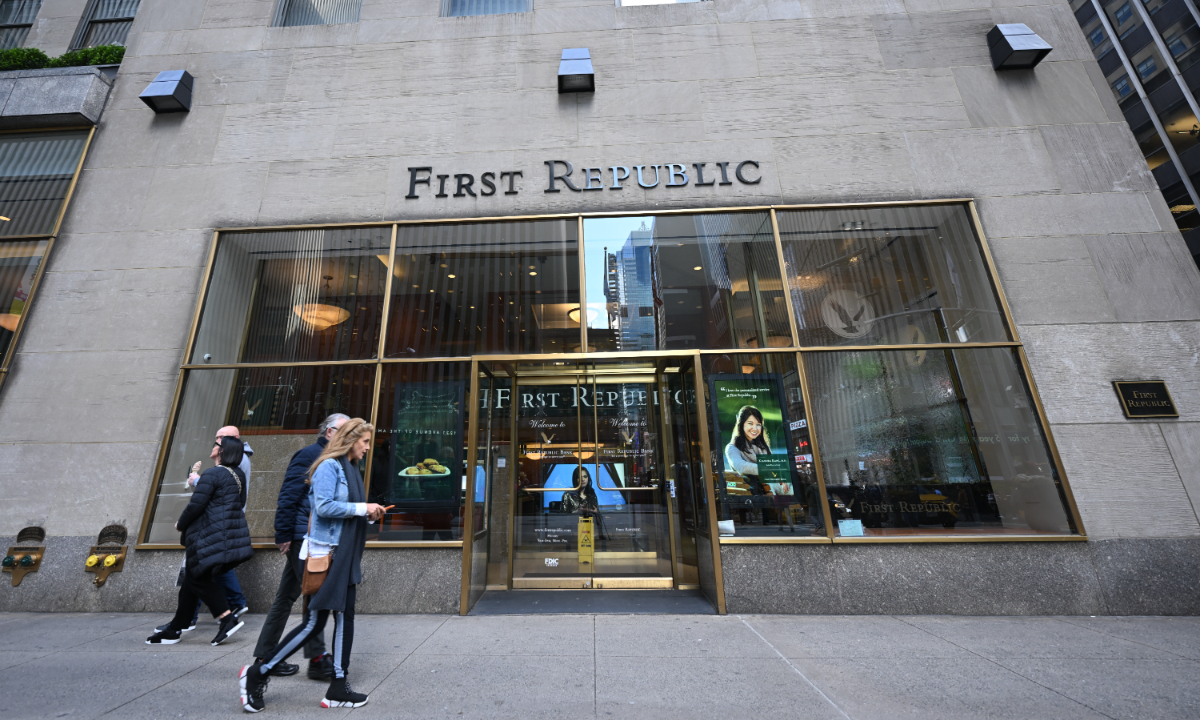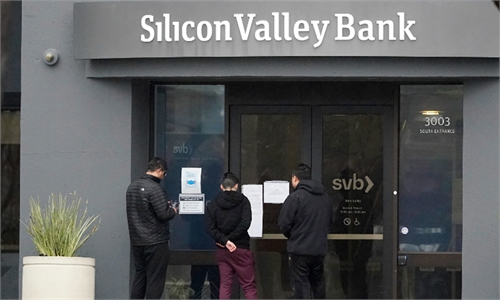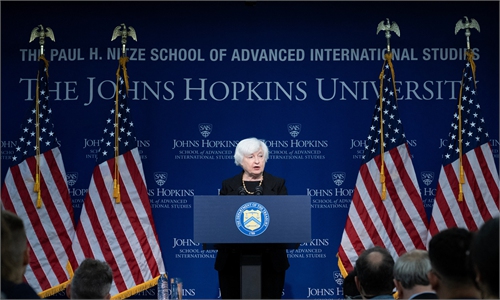First Republic crisis sends shockwaves across market; expert warns over a possible US economic recession
Observers warn over a possible US economic recession

Pedestrian pass by First Republic Bank in New York on May 1, 2023. Photo: VCG
US regulators have taken over First Republic Bank and struck a deal to sell the bulk of its operations to JPMorgan in an attempt to "save" the troubled lender. It's the third mid-size bank in the US to fail in about two months, with concerns over a systemic contagion spreading further among investors.
The collapse of the San Francisco-based First Republic, the second-largest bank to failure in US history, indicates that the current "whack-a-mole" approach cannot fix the increasing fragile banking system as the US Federal Reserve continues to walk the tight rope, observers said, who are warning about a potential economic recession of the world's largest economy and spillovers to more nations in sight.
In the latest development, PacWest, which has lost about 85 percent of its value since the beginning of March, has been weighing a range of strategic options, including a sale, according to a report from Bloomberg on Wednesday, citing people familiar with the matter.
The Pacific Western Bank has about 70 branches and about $44 billion in assets. It mainly focuses on providing business banking and treasury management services to small, middle-market, and venture-backed businesses, according to its official website.
"A fourth or fifth wave of banking crisis is brewing, that's obvious," Gao Lingyun, an expert at the Chinese Academy of Social Sciences in Beijing, told the Global Times.
Ineffective bailout
The rescue of First Republic was announced on early Monday. The California Department of Financial Protection and Innovation said regulators had taken possession of First Republic and the Federal Deposit Insurance Corporation would act as its receiver.
JPMorgan Chase & Co, the banking giant will assume $173 billion of loans and about $30 billion of securities held by First Republic Bank, according to a Reuters report on Monday, citing a statement from JPMorgan.
The New York Stock Exchange has announced plans to delist shares of the bank on Tuesday. Apart from the company's common stock, seven different types of its preferred stock will also be delisted. Trading in all the shares will be suspended immediately, the exchange said.
"The collapse of First Republic indicates the problem in the sector is more severe than predicted; we once believed the crisis had been eased after the previous bailout," an investment manager at a Beijing-based bank told the Global Times on Thursday.
Large US banks have already injected $30 billion in deposits into First Republic Bank in March, after the failure of Silicon Valley Bank and Signature Bank shocked the US banking industry.
Now as the "whack-a-mole" approach adopted by US regulators has proved to be ineffective, more banks will likely to fail in the future, said the manager, who asked to remain anonymous.
After the Monday takeover, a US Treasury spokesperson said the department is "encouraged that First Republic Bank was resolved with the least cost to the Deposit Insurance Fund," and believes the US banking system remains "sound and resilient."
In a speech made in March when addressing the Silicon Valley Bank and Signature Bank crisis, US President Joe Biden has thanked the quick action of its administration, saying Americans can "have confidence that the banking system is safe."
Biden said that he is going to ask Congress and banking regulators to strengthen the rules for banks to "make it less likely that this kind of bank failure will happen again and to protect American jobs and small businesses."
However, a tumble by other US regional lenders have also continued despite the bailout over the week, dragging on the performance across board. "The sell-off trend in Wall Street may not end anytime soon as banking turmoil worsened," the manager said.
No solution in sight
"The worst part is that Biden administration may have no way to address the dilemma - the Federal Reserve's interest rate hike cycle has continued, and the rising rates dented the value of loans the bank made when rates were near zero - thus more regional banks and small businesses will be exposed to risks, that's inevitable," Gao cautioned.
On Wednesday, the Federal Reserve raised its key interest rate by a quarter-point to the highest level in 16 years.
Federal Reserve chairman Jerome Powell stressed at a press conference that inflation remains the chief concern, and it is therefore too soon to say with certainty that the rate-hike cycle is over, according to a Reuters report.
The banking collapse, coupled with the debt problem and inflation pressure may only marked the prelude of an economic crisis in the world's largest economy, Gao said, warning of a recession in sight and a potential global domino effect.
But the US could have avoided such a situation, or at least inflation rate would not be that high, if it at any time stopped its irresponsible monetary policy, or was not imposing trade protectionism on China, said the expert.
US economic growth slipped in the first quarter of 2023, with GDP rising at an inflation- and seasonally-adjusted 1.1 percent annual rate from January to March, a significant slowdown from 2.6 percent growth in the fourth quarter, according to a Wall Street Journal report on April 27, citing data from the Commerce Department.




